Current
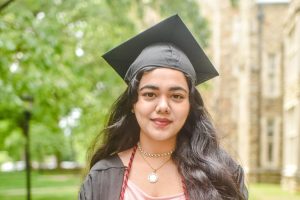
Nowreen Sarwar
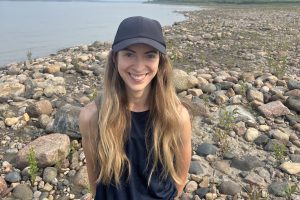
Danielle Klassen
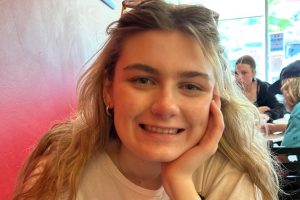
Abbey Bossenberry
My name is Abbey Bossenberry, and I am a Level III Honours Health Sciences student at McMaster University with a strong interest in the social determinants of health and accessibility to health. My research focus includes Indigenous health, particularly the role of traditional knowledge in shaping equitable and community-driven health practices. Under the supervision of Dr. Kelly Skinner, I will explore community-based food systems and their impact on health and wellness in an independent project course. I also love Anatomy and Physiology, and I’m excited to be a teaching assistant for the 2025/26 school year!
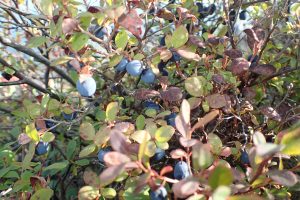
Afreen Nagra
My name is Afreen Nagra, and I am beginning my Master of Public Health under the supervision of Dr. Kelly Skinner. My thesis will explore type 2 diabetes in Inuit communities in the Northwest Territories, focusing on the accessibility of health resources and support systems.
I recently graduated from Wilfrid Laurier University with a Bachelor of Health Sciences and had the time of my life learning about the intricacies of health, which I can’t wait to apply and further explore in my master’s!
A fun fact about me is that my love for health spans from the molecular to the population level. I adored classes like organic chemistry, studied cancer therapies in undergrad research, but also care deeply about the social factors of health and how lived experiences shape health outcomes. Whether I’m in a lab or a community space, I love exploring how science and society connect.

TAMARA MCCALLUM-Nadon
My name is Tamara McCallum-Nadon from Mississauga First Nation, living in Toronto. Supervised by Dr. Kelly Skinner, as a master’s student my main research interests are food security, research methods and Indigenous health. With six years of experience working as a researcher in the community. This work has mostly been supporting First Nations persons across Canada address MMIWG Calls to Justice, racism healthcare and mental health.

PRYA IYER
Priya is a PhD student in the School of Public Health Sciences at the University of Waterloo under the co-supervision of Drs. Kelly Skinner and Jennifer Yessis. She holds a Master of Public Health (MPH) from Simon Fraser University and a Bachelor of Science (BSc) in Genetics from McMaster University. As a public health professional, she has 10+ years of work experience in policy, research and evaluation in areas including chronic kidney disease, long-term care, and education. Presently, as a Senior Advisor in the Ontario Public Service (OPS), her work supports the mental health of public safety personnel in Ontario. A freelance journalist since 2018, she has contributed stories to media organizations including Al Jazeera and TVO. Her PhD focus will explore factors impacting mental health among public safety personnel and first responders.
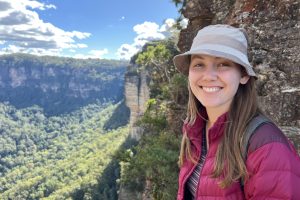
Maya Morton Ninomiya
Maya is from Kitchener-Waterloo and is of mixed European and Japanese descent. Maya is currently completing her fourth year of an undergraduate degree in Health Science at the University of Waterloo.
She works as a Research Officer at the National Centre for Aboriginal and Torres Strait Islander Wellbeing Research investigating the impacts of colonisation on cancer experience and outcomes for Aboriginal and Torres Strait Islander Peoples, under the supervision of Dr. Lisa Whop and Dr Raglan Maddox. Maya also worked as a research assistant for the Department of Surgery investigating surgical outcomes for mastectomy and breast reconstruction for breast cancer patients, under the supervision of Dr. Kathryn Isaac. Maya’s main areas of research are Aboriginal and Torres Strait Islander health and wellbeing, and recruitment for surgical clinical trials.
Maya is a graphic illustrator and likes to incorporate this into her research. This is a link to her website: https://innographicmaya.weebly.com/

Aimee Yurris
Aimee Yurris started her master’s in the University of Waterloo School of Public Health Sciences under the supervision of Dr. Kelly Skinner in September 2022. She is from Yellowknife, Northwest Territories, and her academic background includes earning a Diploma in Culinary Arts from the Northern Alberta Institute of Technology and a Bachelor of Health Sciences in Indigenous Health and Population Health at the University of Lethbridge. Aimee enjoys gardening with the Yellowknife Community Garden Collective, facilitating Youth & Elder cooking programming with the Tree of Peace Friendship Centre, and sewing with her mom and sister.
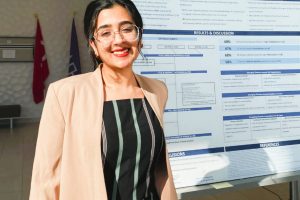
Sanaa Hussain
Sanaa recently completed my BSc in Health Studies at the University of Waterloo, during which she completed multiple co-op positions and wrote a scoping review for her honours thesis on lived experiences of diabetes and of using clinical diabetes care for Indigenous populations within Canada. Her research focus will be on understanding lived experiences of diabetes for Northern Indigenous groups within Canada and exploring hthe ow cost of and access to food impacts diabetes management. In her spare time, she enjoys painting pottery, self-learning American Sign Language, and going to the gym!
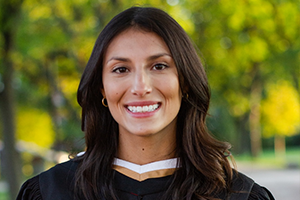
Maria Ramirez
Maria is a PhD candidate in the School of Public Health Sciences at the University of Waterloo under the supervision of Dr. Kelly Skinner. Maria started in the fall of 2021 after fast-tracking from the MSc program. Her PhD focus is on exploring Inuvialuit youth experiences within the country food system to better support food security and food sovereignty efforts in the Inuvialuit Settlement region through participatory and decolonizing methodology. She is a SSHRC doctoral fellow and the 2024 receipt of the Association of Canadian Universities for Northern Studies CNST doctoral award. Prior to this, Maria graduated from the University of Guelph with a Bachelor of Arts and Science, specializing in Nutrition and Nutraceuticals and International Development. In her spare time, Maria enjoys volunteering and getting outdoors with her dog, Migo.
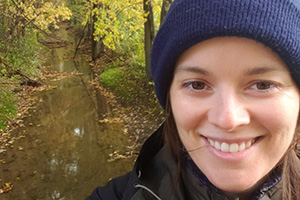
Ashley Wood-Suzko
Ashley Wood-Suszko began her PhD in the school of Public Health Sciences in 2021. Prior to commencing her PhD journey, she completed her Master of Health Evaluation (2020) and two undergraduate degrees in Biology (2006) and Health Studies (2007). Ashley became interested in research during her position as Clinical Research Coordinator in the Anaesthesia Department at the University Health Network. In this role Ashley gained a sturdy foundation in clinical research and recognized her true passion of supporting employee health and wellbeing, and improving organizational culture to be both physically and psychologically safe. Ashley’s career and academic goals are to add to the theoretical knowledge database on workplace wellness, develop supportive tools to increase holistic wellbeing, and help those in leadership roles to understand the direct link between healthy staff, improved organizational outcomes and its transcendence to the community and population at large. Ashley practices her own wellbeing by exploring the world with her two incredible children and husband. Together they love to spend time in nature, on the water, or even under the water’s surface diving.
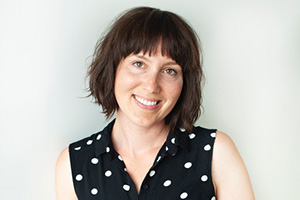
Tasha Lake
Tasha is a PhD candidate in the School of Public Health Sciences, under the supervision of Dr. Kelly Skinner. Tasha completed a BSW at Laurentian University, with a focus of social work in Northern, rural and Indigenous communities. And a MSW at Ryerson University. Her Master’s research explored indigenous perspectives of relationship building in a child welfare context. Tasha is a registered social worker and registered psychotherapist, she has lived in British Columbia, Northwest Territories and Ontario and has worked in various community, primary care and private practice settings. Tasha’s research interests include mental health, climate change and equity among marginalized and Indigenous communities. In addition to her work life, Tasha is a mother, yoga teacher/student and lover of the outdoors, food and coffee!
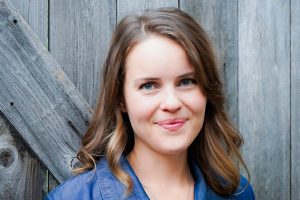
Laura Peach
Laura is a PhD candidate in the School of Public Health Sciences at the University of Waterloo under the co-supervision of Drs. Kelly Skinner and Hannah Tait Neufeld. Her research interests include food literacy among urban Indigenous children and youth and land-based programming. In her work as a Research Project Manager for Kelly, she supported several of Kelly’s food security projects in the Northwest Territories and Northern Ontario. Laura has also worked on other community-based research projects with First Nations communities and urban Indigenous populations in southwestern Ontario investigating the impact of community-developed mental health wellness strategies and the role of Indigenous food spaces in repossessing place. She holds an honours Bachelor of Science in Nutrition and Dietetics and a Master of Arts in Geography from Western University.
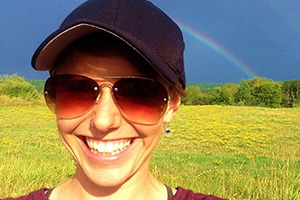
Julia Russell
Julia is a PhD candidate in the public health and health systems program. Her research focus is on veganism, food security, health, and wellbeing. She has a Master of Science degree in community health science from the University of Northern British Columbia and an honours Bachelor of Science from the University of Toronto, where she completed a specialist program in international development studies, and a major in environmental science.
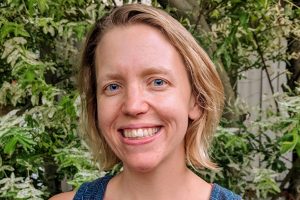
Josalyn Radcliffe
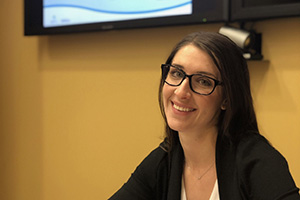
Alle Butler
Alle is currently a part-time PhD student under the co-supervision of Dr. Kelly Skinner. Her dissertation research focuses on high-risk substance use behaviours among Canadian youth and will evaluate how school closures resulting from COVID-19 have impacted these indicators of health and wellbeing. She recently obtained my Master of Science degree from the School of Public Health and Health Systems at the University of Waterloo. She has been working with the COMPASS study where her research is focused on primary prevention among Canadian youth and population health evaluation across various personal and environmental factors. Outside of research, she enjoys being active outdoors and travelling.
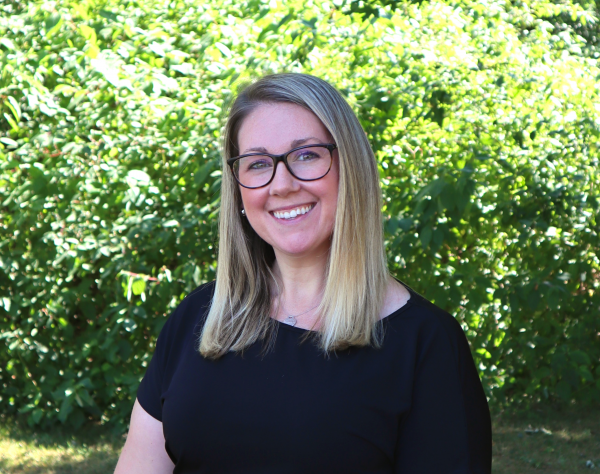
Melissa Potwarka
Melissa is a proud mom to Evie and Ethan and loving partner to Luke. Melissa and her family love to play at their neighbourhood Park in Waterloo, go swimming, and play soccer and baseball in their backyard. Spending quality time with friends and family is their favourite thing to do. Melissa is a part-time PhD student in the School of Public Health and Health Sciences. After graduating from her MSc in Health Studies in Gerontology, Melissa worked for a municipal Public Health unit in various roles for 10 years before returning the University of Waterloo. In her professional role, Melissa works with a diverse groups of students, staff and faculty towards the transformative vision of the Okanagan Charter: An international charter for health promoting universities and colleges. Melissa is particularly passionate about working with students, championing grassroots initiatives to support wellness, as well as increase leadership capacity for health promoting universities initiatives. Melissa also serves as the co-chair of the Canadian Health Promoting Campuses Network. Melissa is committed to working collaboratively to address systemic barriers in higher education, with individuals from all walks of life, to create a campus cultures of compassion, social justice, and wellbeing.
In her doctoral studies, Melissa is broadly interested in intersecting mandates of health promoting university initiatives with diversity, Indigeneity, and anti-racism efforts in higher education. Melissa is interested in taking a critical approach to assessing the impact of health promoting universities and contribute to the theoretical understanding of a whole systems approach to wellness in higher education, using an equity-informed approach.
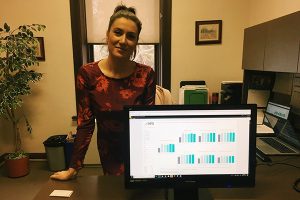
Sarah Sousa
Sarah is a doctoral candidate at the University of Waterloo (School of Public Health Sciences) pursuing her degree in implementation science and program evaluation. Her dissertation focuses on exploring the process and impacts of the implementation of technologies that are designed to improve the lives of older adults (AgeTech) on dementia care in rural and northern communities.
Sarah has over a decade of combined academic and professional experience in health research and program evaluation. She was a senior research and evaluation associate for a national research organization in the field of mental health and addictions and continues to work as a program evaluator for various organizations across Canada. In her spare time, Sarah enjoys fitness, travelling and spending quality time with friends and family.
Former

Julia Russell
Julia completed her PhD in 2025 in the public health and health systems program. Her research focused on veganism, food security, health, and wellbeing. She has a Master of Science degree in community health science from the University of Northern British Columbia and an honours Bachelor of Science from the University of Toronto, where she completed a specialist program in international development studies, and a major in environmental science.

Ashleigh Domingo
Dr. Ashleigh Domingo completed her Post-Doctoral Fellow in the School of Public Health Sciences at the University of Waterloo. She is now an Assistant Professor in the department of Human Health and Nutritional Sciences at the University of Guelph. She collaborates with Indigenous communities, organizations, and an interdisciplinary team of researchers to strengthen local capacity and community-led responses to food security and climate-health adaptation in Ontario and the Northwest Territories. She also engages in collaborative and community-based research in the Philippines to support food security, nutritional health, and health equity. Ashleigh obtained her PhD from the School of Public Health Sciences at the University of Waterloo and holds an MSc in Population and Public Health from the University of British Columbia and an HBSc from the University of Toronto. Her research interests include Indigenous food security, health equity, and community development using a range of methodological approaches such as participatory action research and implementation science. She has led culturally safe engagement processes with Indigenous and equity-deserving communities and organizations, embracing relational approaches to centre community priorities, self-determination, and actions towards health equity in Canada and globally.
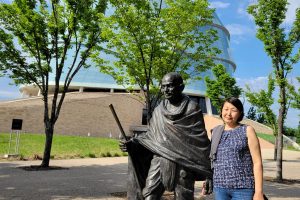
Lena Dedyukina
Lena Dedyukina completed her MA student in the Department of Geography, Environment, and Geomatics (University of Ottawa) under the supervision of Dr. Sonia Wesche (University of Ottawa) and Dr. Kelly Skinner (University of Waterloo). Lena worked in close collaboration with the community researchers evaluating the Nutrition North Canada (NNC) cooking circle program in the hamlet of Paulatuk (NWT). She completed an Honours BSocSc with a Major in Sociology and a Minor in Indigenous Studies at the University of Ottawa in 2020 (Summa Cum Laude). Lena is an Indigenous woman belonging to the Yakut (Sakha) nation from the Republic of Sakha (Yakutia) in the northeast part of Russia. She traveled around the world with her husband and children living in France, and Singapore, and visiting Thailand and Australia until settling with her family in Ottawa in 2010. Lena enjoys hiking, kayaking, photography, painting, and gardening. Lena is now pursuing a PhD at the University of Ottawa.
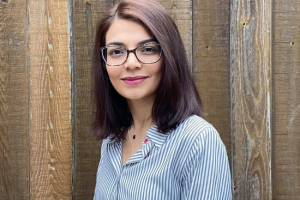
Camelia Tavakoli
Camelia was a Master of Science candidate in the School of Public Health Sciences at the University of Waterloo. She was co-supervised by Dr. Kelly Skinner and Dr. Brian Laird. Her master’s research focused on arsenic and mercury fish tissue contamination in Fort Albany, Ontario. She graduated from Simon Fraser University with a Bachelor of Science in Environmental Science. During her undergraduate studies, she conducted research in an Environmental Toxicology lab at Simon Fraser University. Camelia is now doing an MPH at the University of Waterloo.
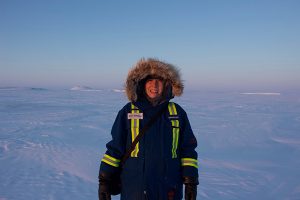
Julia Gyapay
Julia Gyapay (she/her) completed her MSc in Public Health and Health Systems at the University of Waterloo with Dr. Kelly Skinner in January 2022. Julia’s research aimed to characterize culturally relevant dietary messages for healthy, safe and culturally appropriate diets in the Inuvialuit Settlement Region, NWT. Prior to beginning her MSc, Julia studied at the University of Victoria (BSc, Biology) and completed her degree at the University of Northern British Columbia (BHSc Honours, Biomedical Studies). Julia was born and raised on Treaty 8 territory in Hay River, NWT, and currently lives on Chief Drygeese Territory in Somba K’e (Yellowknife) where she works as a Research Associate in Community Engagement and Climate Change Adaptation for Wilfrid Laurier University. In her free time Julia enjoys coaching cross-country skiing, creating new recipes, and practising beadwork.
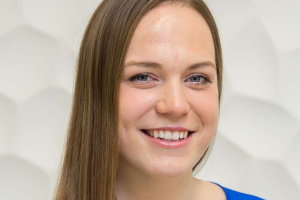
Breanna Phillipps
Breanna Phillipps holds an Bachelor of Human Kinetics (French Immersion) from the University of Ottawa where her honours project explored how cultural safety is being used in health initiatives targeting Indigenous populations in Canada. Breanna completed her MSc in the School of Public Health and Health Systems. Breanna worked broadly on projects related to food security, traditional foods, climate change, northern food systems, and food policy with Indigenous populations in northern Ontario and the Northwest Territories. Her thesis research used a feminist and community-based methodology to explore access to traditional foods for Indigenous Peoples through interviews in two urban northern Ontario cities. Breanna’s academic interests relate to the intersections of culture, race, and health, health equity, chronic disease prevention, sustainable food systems, and decolonizing research practices. As an elite rugby athlete, she enjoys spending her free time coaching young women at the university and club levels.
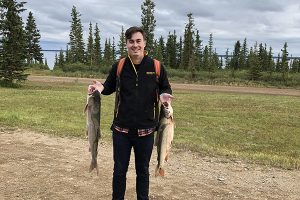
Connor Judge
Connor completed his MSc and worked as a research assistant under Dr. Skinner’s supervision. As a research assistant, Connor helped assemble the First Nations Regional Health Survey Report Phase 3, 2015-2016 Northwest Territories, and supported the Old Crow Biomonitoring Program. His Master’s research aimed to understand how an Indigenous self-government can utilize a mobile abattoir (or meat trailer) as a tool to increase food access in Deline, Northwest Territories. His project involved conducting a process evaluation on a country food processing training course taught in the meat trailer, which informed how the trailer can be used to increase community food access. In addition to the evaluation, his project included a critical discourse analysis on written policies with jurisdiction over accessing wild food in the Northwest Territories, which identified the policies to which the trailer is subject, and informed different discourses within communities and government institutions about these current policies. Connor completed his Bachelor of Science in Health Studies with a Minor in Political Science at the University of Waterloo. In his spare time, you can find Connor trying new recipes, or cheering on his favourite sports teams and Esports organizations.
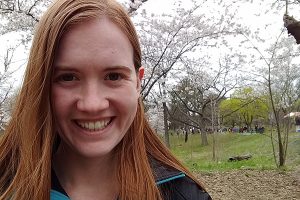
LAURIE HAIG
Laurie was an undergraduate co-op student working as a Research Assistant with Kelly Skinner. Her main work focused on the use of equine-assisted learning with Indigenous youth and supporting other ongoing projects. She completed her Bachelor of Public Health at Waterloo and is originally from Ottawa, Ontario.
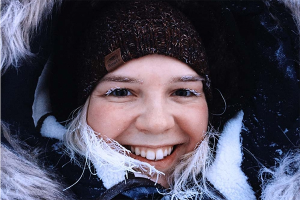
Danielle Brandow
Danielle completed her Master of Science in Public Health and Health Systems under the supervision of Dr. Skinner in 2018. Her thesis, titled, Country Food Consumption Notices: Assessing Awareness and Preferences of Health and Risk Communications Messages in the Sahtú Region of the Northwest Territories, focused on determining risk perceptions and awareness of current consumption notices and health messages [advisories] using survey data, two terminology workshops, community interviews, and stakeholder interviews. These quantitative and qualitative methods were used in order to provide data to evaluate the impact of consumption notices, to determine how health messages are currently developed and to make recommendations to create more targeted communication strategies. Previously, she completed her Bachelor of Science in Health Studies from the University of Waterloo in 2016. Danielle loves to spend time outdoors [hiking, biking, swimming doing yoga] and especially doing those things near water!
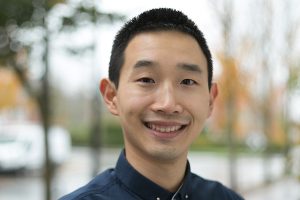
James Jung
James completed his independent study with Dr. Kelly Skinner during his final year of undergrad in the Health Studies program. For his independent study project, James produced a scoping review on the socioeconomic and cultural risk factors for acute gastrointestinal illness. After completing his BSc in Health Studies in 2016, he continued his work with Dr. Skinner as a Research Assistant and produced a second scoping review that was successfully published, which focused on the factors related to foodborne and waterborne illness among Canadian Indigenous populations. James went on to complete his Master of Public Health in Epidemiology at the University of Toronto. He worked at ICES following graduation and now works at the Ontario Renal Network evaluating hospital performance data related to chronic kidney disease services. His Korean name means “to be healthy”, so he’s confident he chose the right field!

